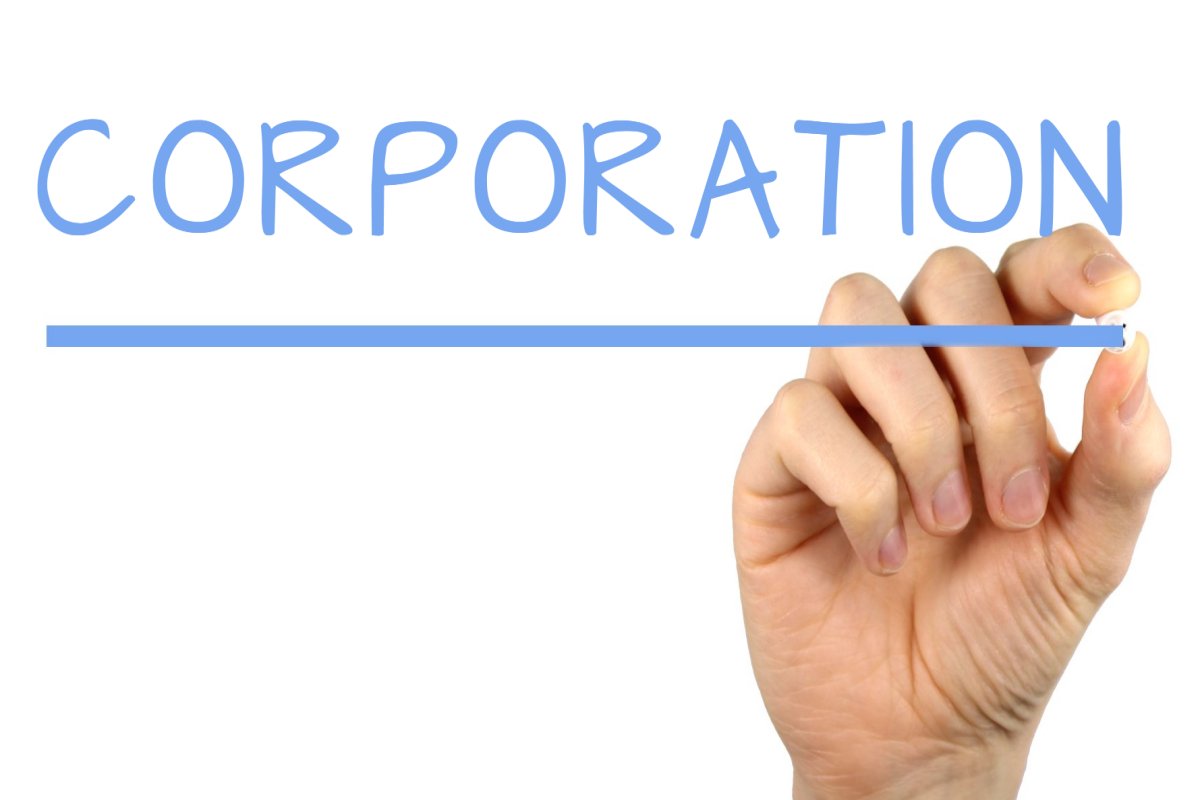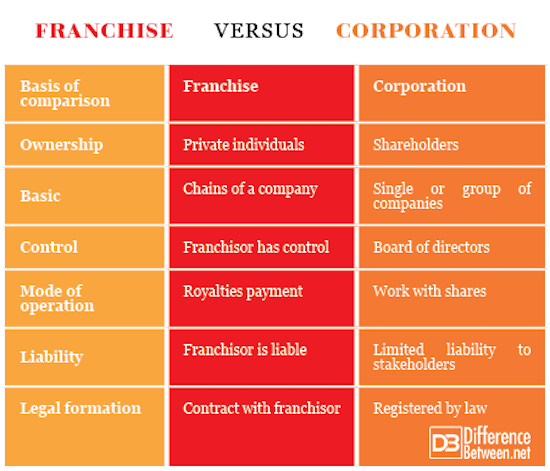Difference Between Franchise and Corporation
In business, it may get confusing getting a clear distinction between a franchise and a corporation. Many individuals are torn when it comes to making a decision on which path to take when it comes to establishing such forms of business. Things to consider however include, market potential, legal procedures, funds, among other aspects. This article will cover some of the main key differences between a franchise and a corporation.
With a franchise, the success of the business will lie on how the franchisees manage the brand name to the customers. If they fail to maintain the brand success, franchisers can buy back the business and sell to someone else. As for corporations, they operate as a firm having a structured layout. All decisions are made by the corporation which is open to selling its shares to other people as shareholders. The board of directors is given the duty to handle business operations on behalf of the whole entity. Some of the main differences between a franchise type of business and a corporation are listed below:
What is a Franchise?
A franchise is a part of the many similar business models that exist through franchising. The franchising idea is a method used by the franchisor to expand business through the distribution of goods and services through the licensing relationship agreement. Owning a franchise favors the franchisor as they get to enjoy various benefits such as a business growth they might not have been able to achieve since all funding of the franchise are under the franchisees. The franchise also continues growing in popularity making the business name hold more weight due to the many branches.
As a franchisor, you are expected to handle all the legal formalities of the business and have a layout that can be implemented towards a successful brand. Convincing franchisees on the idea of the business is up to the franchisor as a way of ensuring individuals get the most out of their investments. Despite being the decision makers and concept creator, franchisees can be involved in any changes you wish to make on the brand to ensure they are also benefiting from the franchise. A franchise form of business is also diverse meaning it can exist in various forms. Either as a corporation, partnership or other forms as long as the brand maintains its trademarks.
What is a Corporation?
A corporation is a business entity that is owned by stockholders or shareholders that has a board of directors who oversee the activities of its organization. As an individual owning a corporation, you have full power and control over your business and all changes made do not need some form of negotiations with franchisees as compared to franchises. This means you have free will to change the products and services you offer without involving franchisees.
However, most corporations have a board of directors that handle different segments of the organization in order to achieve smooth operations of the business. Your corporation also has shareholders and investors who offer monetary input to the organization but the liability is limited to the corporation since you are the power of the organization. The legal documents and structure of a corporation vary from that of a single franchise because it is operating as a large organization.
Difference Between a Franchise and Corporation
1) Ownership
Franchises are owned by third-party operators that are independently known as “franchisees” whereas corporations are owned by stockholders who share generated profits and losses from their operations.
2) Basic
Franchises are the same business with many branches that are licensed to third-party individuals while corporations are companies that come together to create a firm set up which can either be profit or non-profit.
3) Control
Franchisees only have rights of managing the single franchise outlets and have no control over the business operation methods which are set by the franchisor. This is means that the pricing, general outlook among other things are set by the franchisor. As for corporations, shareholders are not involved in decision making and are hence represented by a board of directors.
4) Mode of operation
Franchisees are expected to pay royalties to the franchisor because they are using the brand’s success name while corporations work with the distribution and acquisition of shares and stocks.
5) Liability
Shareholders within a corporation have limited liability which means their shares or assets will not be affected directly in the rise of a legal dispute while in franchises, the franchisor is held liable for the actions of the franchise employees.
6) Legal formation
Corporations require a long legal process which involves various documents that need to be availed before gaining a legal recognition but a franchise is a contract agreement between the franchisor and franchisees handing over permission to use the franchise’s trademarks among other things.
Franchise Vs. Corporation: Comparison Chart
Summary of Franchise Vs. Corporation
- Franchises are owned by third-party operators that are independently known as “franchisees”.
- Corporations are owned by stockholders who share generated profits and losses from their operations.
- Rights to the trademarks, trade secrets, marketing and service information, copyrights and other information of the franchisor are given to the franchisees. Hence royalty payments.
- Corporations depend on selling of shares and investors to sustain the firm.
- A franchise is a business existing with similar structure and method of operation and is owned by one Franchisor.
- The shareholders of a corporation are not liable and are considered as a separate entity.
- The franchisor is liable for the actions of the actions of the franchise’s employees.
- Corporations have a legal process of formation which needs to be observed for registration to be valid.
- Formation of a franchise is a recognizable contract agreement by law between the franchisor and the franchise.
- Difference Between S Corp and C Corp - September 9, 2018
- Difference Between Terrace and Balcony - September 9, 2018
- Difference Between Anabaptists and Evangelicals - August 31, 2018
Search DifferenceBetween.net :
1 Comment
Leave a Response
References :
[0]Buckley, F. H. (1999). The Fall and Rise of Freedom of Contract. Duke University Press.
[1]Mergers & Acquisitions of Franchise Companies. (1996). American Bar Association.
[2]Goddard (Jr.), W. (1702). The Law of Corporations: Containing the Laws and Customs of All the Corporations and Inferior Courts of Record in England. assigns of R. and E. Atkins.
[3]Image credit: http://www.creative-commons-images.com/handwriting/images/franchise.jpg
[4]Image credit: http://www.creative-commons-images.com/handwriting/images/corporation.jpg




So for example if Boots was bought by HMV, Boots is now called franchise business. You couldn’t start your own unique business and label it a franchise. Is that correct?